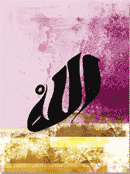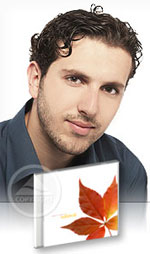“All mankind is from Adam and Eve, No Arab has any superiority over a non-Arab, nor does a non-Arab have any superiority over an Arab. Nor does a white man have any superiority over a black man, or a black man any superiority over a white man except by piety and good action.”
— Prophet Muhammad, in his Farewell Sermon.
Category: Islam
Happy New Hijri Year
I would like to wish everyone a Happy New Hijri Year 1427.
May it be a blessed, happy and joyful new year for you all bringing you prosperity, success and great health.
Most households in Tunisia cook Mloukhia on this day, because Mloukhia is green, as a way of hoping there’ll be a green and fruitful new year ahead.
We’ll be going over to my parent’s place for lunch, then enjoying the rest of the day off relaxing at home.
Eid El Adha Mubarak
Eid El Adha, or the big Eid, as we Tunisians call it, is tomorrow.
The big Eid comes with the end of the Hajj, and is the day in which muslims worldwide sacrifice sheep in commemoration of the prophet Abraham’s story with his son.
It’s also a day of sharing, as people are supposed to give away some of the sheep meat to the poor.
Prices for sheep have sky-rocketed this year, even more than previous years, it’s as if they run on oil or something. Yet that hasn’t stood in the way of Tunisians obsessively competing to buy their sheep.
As usual, we’ll be going to my parent’s place for lunch, then visiting some close relatives.
Eid Mubarak to everyone.
May it be a happy and blessed Eid for you all.
And hey, take it easy on your stomachs…
Sami Yusuf – Hasbi Rabbi
Today while flipping through Arab satellite music channels I came across Sami Yusuf’s video for his new song “Hasbi Rabbi”.
The song is so beautiful, the music, the lyrics, Sami’s voice, the video, all of it…
The lyrics are in 4 languages: English, Turkish, Hindi and Arabic; The melody is from the Afghani folklore; and the video is shot in England, Turkey, India and Egypt.
Hindi lyrics are by Ustadh Mehboob, Turkish lyrics by Ustadh Firooz, and Arabic & English lyrics by Bara Kherigi.
It’s one of Sami’s best songs, and I can’t wait to hear it again and to get his new album “My Ummah”.
To listen to an audio sample of the song, click here: Hasbi Rabbi.
To buy Sami Yusuf’s new album, go here: My Ummah.
Eid El-Fitr in Tunisia
So it’s confirmed that Eid El Fitr, the Islamic holiday that marks the end of the holy month of Ramadan, will be tomorrow in Tunisia.
Happy and blessed Eid to everyone.
This Eid is also called the small Eid in Tunisia, the big one being Eid El Adha.
Many traditions and practices are associated with this Eid in Tunisia, which I think is one of the most beautiful days of the year.
In the days before the Eid, all the fuss is about getting different varieties of traditional sweets, that will be served to the guests, and buying new clothes for the whole family to wear and celebrate the Eid in.
In the morning of the Eid, the Eid prayers are held in mosques all over the country, which are an amazing experience that starts with lots of supplications and chanting, that can be heard throughout the neighbourhoods, and is then followed by a sermon and prayers.
Before the Eid prayer begins Zakat al Fitr, a little charity, is distributed by every household depending on the number of it’s family members.
After that, the men and kids of the family, all dressed up in their new clothes, go out and start visiting and wishing a happy eid to members of the extended family tree and friends, making it a great chance to reconnect and reunite with the family and friends.
The only downside is that they get served sweets at every house and they have to take some, which means that they end up stuffed with sweets at the end of the day.
As for the women, they stay at home to receive the guests; the men and kids of other relatives.
The closer family then gets together over lunch or dinner at the family house, or the eldest member’s house. The meal in the Tunis area is in most cases either “Mloukhia” or “Madfoona”.
Children love this day because they are given gifts and money by their parents and the close family members they visit.
I personally love how this Eid brings families together and reunites them. I hope we had more days like in the year.
Like many others, I too always seem to feel a sense of nostalgia to the days of Ramadan.
May God give us all the opportunity to live through another Ramadan, and Eid Mubarak to everyone all over the world.
And as we say in Tunisia: Eidik Mabrouk & Sneen Dayma (Blessed eid & lasting years).
Muslims In The West
Tariq Ramadan has written a great new article on the role of Muslims in the west in the evolution of Islam worldwide and in the new reform movement that is being born.
[…]
“Western Muslims will play a decisive role in the evolution of Islam worldwide because of the nature and complexity of the challenges they face, and in this their responsibility is doubly essential. By reflecting on their faith, their principles, and their identity within industrialized, secularized societies, they participate in the reflection the Muslim world must undertake on its relationship with the modern world, its order, and its disorder.”
I totally agree that the Muslims living in the west have a very big responsibility to take a more active and positive role in the dialogue between civilizations and in the evolution of Islam.
These muslims should stop identifying themselves as
Visual Dhikr

While surfing around the web, I came across the site Visual Dhikr, which is for an art project launched by two UK Muslim artists Ruh Al-‘Alam and Abu Taha.
As muslims we are always looking back at our history and praising the achievments of our forbearers. Their amazing artistic and architetcural achievments that are a source of pride, as well as a valuable contributor to our unique cultural heritage, are becoming a thing of the past.
Visual Dhikr aims to help nurture the revival of Islamic Art in a contemporary fashion that compliments our lives, in our home, in the modern age.
I think this is so great.
I love the artworks that they’ve put on the site and think that it’s great they merge Islamic and contemporary art so beautifully.
[Site: Visual Dhikr]
No Compulsion in Religion
“Let there be no compulsion in religion. Truth has been made clear from error. Whoever rejects false worship and believes in Allah has grasped the most trustworthy handhold that never breaks. And Allah hears and knows all things.”
[The Koran: Sûrah al-Baqarah: 256]
Mesut Kurtis, Salawat
A new nasheed artist by the name of Mesut Kurtis has launched his debut album called “Salawat”.
This album was produced by Sami Yusuf and a special track also features him.
This amazing album also contains the famous Burda by Imam Al-Busari. The songs on this album beautifully and seamlessly blend lyrics in Arabic, Turkish and English.
Mesut Kurtis was born in 1981 in Macedonia to parents of Turkish origins. He comes from a very religious and scholarly family. His great grandfather was a well known scholar at the time of the Ottoman Empire. He is fluent in 5 languages. He has recently finished his Islamic Law course at the European Islamic Institute in Wales.
For a sample compilation from the “Salawat” album, click here.
For more information, check out the Awakening website.
Worship of God
“O my Lord, if I worship You from fear of Hell,
burn me in Hell,
and if I worship You in hope of Paradise,
exclude me thence,
but if I worship You for Your own sake,
then withhold not from me Your Eternal Beauty…”— Rabi’ah al’Adawiya,
Muslim & Sufi mystic poet born in Basra, Iraq
(717 – 801 CE)
This is just so beautiful…
